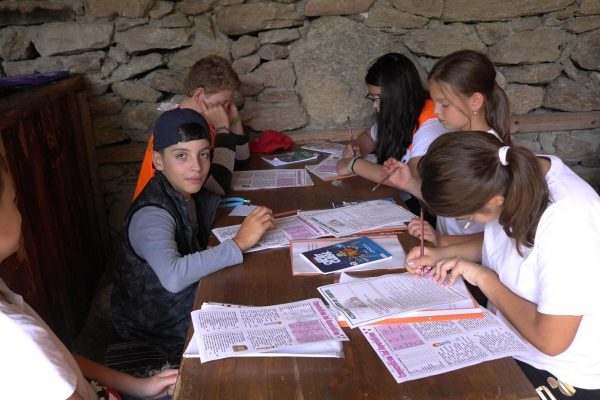Each child shows an increased interest in music in the first few years of life, sensitively reacting first to the sound of an ordinary rattle and a lullaby performed by his mother. This natural curiosity and features of the perception of tones should be used correctly to cultivate a love of music.
Often, teaching a child at music school turns into real torture for both parents and the future pianist or violinist. In the end, both of these activities begin to seem either wholly meaningless or hated, and the music girl school is forgotten, like a nightmare. However, what if the learning process is organized so that it is attractive to everyone: the child, parents, and the teacher?
The time has come!
There are two periods when a child begins to show interest in music.
- The first begins at the age of eight and lasts no more than a year, but it is at this age that the kids themselves are asked to teach them how to play an instrument they like, go to concerts willingly, sing. It is essential not to miss this moment of interest in music and to drive kids at this time, for example, to ballets based on the fairy tales “Sleeping Beauty,” “The Nutcracker.” During the intermission, bring the child to the orchestra pit, examine the instruments, and tell how they sound differently.
- The second period of interest in music is older adolescence. Teenagers strive to prove themselves as individuals, and the music becomes one of the ways they express themselves.
A guitar or a drum?
Each instrument has its pros and cons. Parents often let their children learn to play their favorite instruments: piano and violin. However, they are considered the most complex, even though they ideally develop a musical ear and sense of style. However, if your baby is restless, you should pay attention to something else.
 A perfect instrument for beginners is the flute: a simple technique of the game, you can quickly learn how to make melodic sounds. Besides, the whistle teaches you how to breathe, increases lung capacity, develops excellent motor skills, it is useful for the nervous system and brain, and helps in the treatment of many diseases, especially bronchial asthma and allergies. The bonus is the low cost of the instrument and a sparing “mode” for parental ears. By the way, according to teachers, learning to play the flute is better to start at the age of 4-5 years.
A perfect instrument for beginners is the flute: a simple technique of the game, you can quickly learn how to make melodic sounds. Besides, the whistle teaches you how to breathe, increases lung capacity, develops excellent motor skills, it is useful for the nervous system and brain, and helps in the treatment of many diseases, especially bronchial asthma and allergies. The bonus is the low cost of the instrument and a sparing “mode” for parental ears. By the way, according to teachers, learning to play the flute is better to start at the age of 4-5 years.
An excellent choice for an overactive or, conversely, a shy boy will be percussion instruments: they will take away excess energy from a hyperactive childand will help those who are timid by nature to relax. Such instruments ideally develop a sense of rhythm, which is essential for those teenagers who try to play rock music.
Even the simplest chords on the guitar sound melodic and beautiful, also, the ability to play the guitar will provide the child with the attention and authority of peers. You can start learning to play the guitar when the child is comfortable holding an instrument.
Support Group
Now let us think about teaching methods.
Children learn easily:
1. Together with mom
Do not leave the child to study alone – let him or her see that parents are sincerely interested in success. Ask your child to play you what s/he learned, and do not get distracted during the game. The child loves to play what s/he does many times over. This allows feelingmore confident and calmer. The first-grader will be more pleasant to make music if a favorite toy “listens” to the kid.
2. In the role of a teacher
 Ask your child to teach a doll or mom to play the instrument. The child will be delighted if the mother notes that s/he knows what she does not. When learning a new work, let the teddy bear “press” the keys. Older children can record sounds on a tape recorder and together hear what they hear.
Ask your child to teach a doll or mom to play the instrument. The child will be delighted if the mother notes that s/he knows what she does not. When learning a new work, let the teddy bear “press” the keys. Older children can record sounds on a tape recorder and together hear what they hear.
3. No criticism
Do not give young Mozart grades – this may discourage from studying, and most of all, the child discourages the interest in the activities of a critic of significant adults. Do not criticize the child, even if s/he does not succeed. Mark only successes, and it is better not to say, “well done,” but “I am proud of you,” “I am glad that you managed to play such a complicated melody.”
4. In a playful way
When learning rudiments of music, it is better not to draw notes, but to shape it, and then attach them to a board on which a musical staff is already drawn. You can buy special notes with a magnet.
Results
To overestimate the benefits of playing music at any age, and especially in early childhood, is simply impossible. It is known that it is much easier for children who study music in preschool age to learn how to read and how to write, memorize, and compose. In addition to this, playing music is a beautiful way of expressing oneself, living feelings that are difficult to put in words.
To cultivate a love of music, parents will not only have to be patient but also analyze each of their actions, struggling with the desire to impose their views on the baby. Of course, parents are the first who form the conception of music within children, but it should be remembered that it should be calm and melodic, without causing the child a sense of fear and discomfort.
Musical studies should be systematic, aimed at teaching the child to distinguish specific artistic works, which should be quite compact and with a pronounced, quickly remembered the theme.
For these purposes, songs from children’s cartoons and small excerpts from classical musical compositions, which can be included when the baby is awake, are perfect. However, to avoid negative associations, during a child’s illness or various procedures that are unpleasant, it is better to withdraw from the musical background.
About the author
Melisa Marzett belongs to those children whom parents wanted to play music and sent to music school to learn how to play piano so, now she plays the piano very well and grateful her mom and dad for their persistence. Persistence is something Melisa also took from them along with curiosity and strived for knowledge. Working as a freelancer for more than five years now and writing articles for text revisions, she keeps on attracting audience all around the world.










